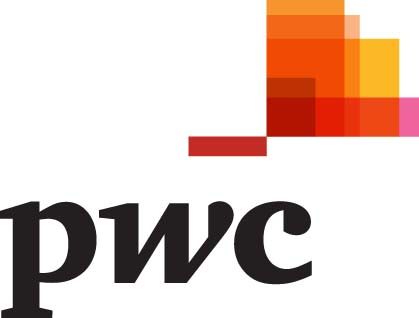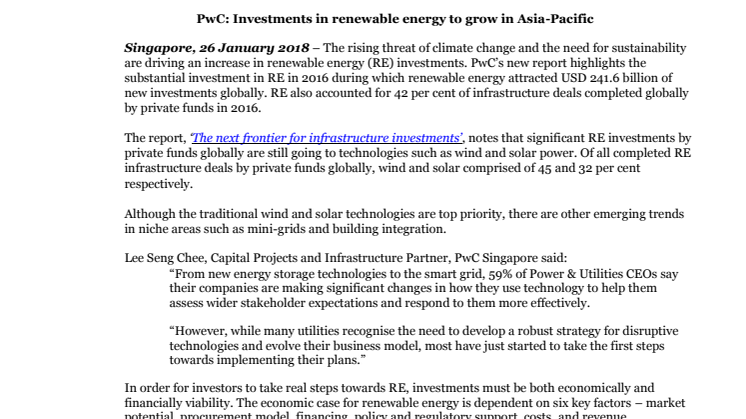
Press release -
PwC: Investments in renewable energy to grow in Asia-Pacific
| Date | 26 January 2018 |
| Contact |
Natalie Choo Mobile: +65 8722 7545 E-mail: natalie.yl.choo@sg.pwc.com Candy Li Mobile: +65 8722 7540 E-mail: candy.yt.li@sg.pwc.com |
Singapore, 26 January 2018 – The rising threat of climate change and the need for sustainability are driving an increase in renewable energy (RE) investments. PwC’s new report highlights the substantial investment in RE in 2016 during which renewable energy attracted USD 241.6 billion of new investments globally. RE also accounted for 42 per cent of infrastructure deals completed globally by private funds in 2016.
The report, ‘The next frontier for infrastructure investments’, notes that significant RE investments by private funds globally are still going to technologies such as wind and solar power. Of all completed RE infrastructure deals by private funds globally, wind and solar comprised of 45 and 32 per cent respectively.
Although the traditional wind and solar technologies are top priority, there are other emerging trends in niche areas such as mini-grids and building integration.
Lee Seng Chee, Capital Projects and Infrastructure Partner, PwC Singapore said:
“From new energy storage technologies to the smart grid, 59% of Power & Utilities CEOs say their companies are making significant changes in how they use technology to help them assess wider stakeholder expectations and respond to them more effectively.
“However, while many utilities recognise the need to develop a robust strategy for disruptive technologies and evolve their business model, most have just started to take the first steps towards implementing their plans.”
In order for investors to take real steps towards RE, investments must be both economically and financially viability. The economic case for renewable energy is dependent on six key factors – market potential, procurement model, financing, policy and regulatory support, costs, and revenue.
Market potential
Many governments in Asia have ramped up their efforts to increase the use of RE in the overall energy mix, with RE targets being significantly higher in some countries when compared to existing capacity. Existing industry forecasts of RE in megawatt (MW) showed that leading countries India (145,929 MW) and Japan (84,040 MW) were more likely to invest in RE by 2025, way ahead of their Asia-Pacific counterparts such as Thailand (8,625 MW), Vietnam (856 MW) and the Philippines (5401MW)2.
Procurement model
Where in the past a Feed-in-Tariff (FIT) mechanism was popular, as of 2017 a majority of Asia-Pacific economies have moved to some form of competitive selection process for RE technologies. This is especially so for utility-scale solar and wind projects.
Now, the most commonly used competitive selective process is the auction systemin which the government sets a target megawatt (MW) capacity for RE before each auction and this capacity is allocated to the lowest price bidders, either in full or in blocks as per the received bids. There have been some variations in this auction system (e.g. Swiss challenge) but the end objective is same, to eliminate RE subsidies and FIT mechanisms if the technology is commercially viable.
The auction system, with its many variants, have pushed bids down in India and Japan over the last few years and this trend is set to continue moving forward.
Costs
In the recent year, the cost of implementing and maintaining RE assets has been going down, making it more viable to adopt RE. The two most widely employed RE technologies - solar and wind - saw their capital costs falling steadily in recent years.
For example, a solar photovoltaic (PV) panel costs account for around 35 to 50 per cent of total capital cost for a solar plant, depending on size of project and type of PV module. Between the end of 2010 and the end of 2017, there was a decline of by around 75 per cent in costs of solar PV module prices.
Aside from the cost of solar PV panels, there have been improvements in supply chain efficiencies and the increased adoption of in-house operations & maintenance all contributing to driving down cost of RE implementation.
Mark Rathbone, Asia Pacific Capital Projects and Infrastructure Leader, PwC Singapore concludes:
“Climate change and environmental damage is at the forefront of business leaders’ minds worldwide, coming in top ten in our most recent Global CEO survey. Coupling that with the reducing costs associated with RE, there is a strong economic case for RE both globally and in Asia-Pacific.
“Besides traditional RE assets, investors are keen to explore avenues to enter the space. Emerging trends such as mini-grids, artificial intelligence and building integration, will ultimately lead the way for more innovative and cost effective means of energy.”
Ends
Notes to editors:
1) Download the report at www.pwc.com/sg/renewable-energy
2) Source: BMI forecast, December 2016
Related links
Topics
Categories
About PwC
At PwC, our purpose is to build trust in society and solve important problems. We’re a network of firms in 158 countries with more than 236,000 people who are committed to delivering quality in assurance, advisory and tax services. Find out more and tell us what matters to you by visiting us at www.pwc.com.
PwC refers to the PwC network and/or one or more of its member firms, each of which is a separate legal entity. Please see www.pwc.com/structure for further details.
© 2017 PwC. All rights reserved



